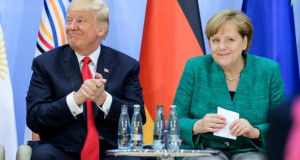Despite a string of various assessments voiced by various politicians and experts at the recent G20 summit in Hamburg, with all of its shortcomings and drawbacks, what we’re witnessing is impressive unity between world leaders. More than two thirds of the world’s population live in the countries represented by the countries participating in the G20, accounting for up to 85% of the world’s GDP and 75% of the world’s trade. The G20 has enough legitimacy to play the role of mediator, making decisions regarding the future trajectory of geopolitics.
The multipolar nature of the G20 allows its members to introduce at least some order amid the complex developments that are taking place across the globe, with the world facing major economic and political challenges on a monthly basis. If there is at least some chance that globalization will be beneficial for the majority on the planet, this goal can only be achieved through subsequent G20 meetings.
Therefore, it is hardly surprising that special attention was paid to the results of the recent G20 summit, along with developments and declarations voiced at the summit by representatives of world’s leading powers, especially the United States. This is why the isolationist approach exhibited by US President Donald Trump at this meeting attracted everyone’s attention, leading some observers into noting that the G20 summit appeared instead to be a G19 meeting.
Strangely enough, the contemptuous disregard shown to the G20 and the multipolar community shown by President Trump was shared by Western warmongers, while they remain confused at what ideals, goals and principles they are allegedly defending.
The US role at the G20 summit, a forum of the world’s most powerful economies which Washington once dominated, is somewhat consistent with what Trump sees as his mandate for a nationalistic, “America first” foreign policy.
As it’s been noted by CNN, international players are now forced to deal with a capricious American president keen to redefine the West in his own nationalist image, who goes against multilateral international politics.
The blind determination with which Trump tried to escape any climate change obligations along with repeated attempts to reserve the US right to introduce protectionist measures have almost jeopardized the signing of the final communiqué. Unfortunately, the US president has once again shown that he couldn’t care less about the global agenda, while making contradicting statements about what the US seeks to achieve.
In fact, this modern American isolationism professed by Trump became obvious in Poland before the G20 summit, where the president who has tried to impose a ban on travel for residents from six predominantly Muslim nations to the US, and halted refugee admittance, voiced his critique of European leaders who have permitted Muslim immigration, he believes, has threatened so-called “Western values”.
At the end of the meeting in Hamburg, Trump declined to give a traditional end-of-summit press conference, leaving it to leaders like German Chancellor Angela Merkel, Russian President Vladimir Putin and French President Emmanuel Macron to give their take on developments with no push-back from the US side.
The broad language appeared of the final communique seems to be an attempt to show that Washington is somehow still a committed member of the G20, even though leaders recognize there are broad differences of approach.
It’s been noted that Washington’s step back has left other nations, especially Germany under veteran Chancellor Angela Merkel, to take up the banner of traditional Western leadership — a stunning scenario given Washington’s decades-long role as a leading global player.
In spite of the isolationist approach that Trump has shown upon the world stage, the remaining 19 players seem to be determined to find a way to approach today’s most pressing problems, while establishing new forms of world’s governance. No matter how hard the US president would dream about creating his own little G1, the world will carry on addressing the critical challenges it faces without the US.
It is also clear that there are sharp differences emerging on what exactly the West, the block of liberal and democratic nations that have dominated global politics since World War II, should stand for. However, the world must prepare for future challenges instead of waiting for waning US leadership, since it may be easier to address certain issues without Washington now, a Washington more interested in advancing its own interests than dealing with critical global issues at hand.
Grete Mautner is an independent researcher and journalist from Germany, exclusively for the online magazine “New Eastern Outlook.”
